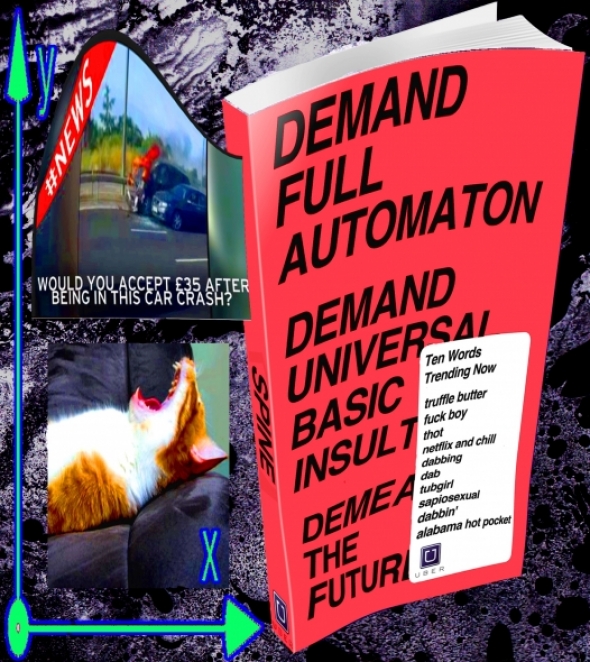In Mute magazine, De-Arrest Editorial Services offers a scathing critique of Nick Srnicek & Alex Williams’ accelerationist work Inventing the Future, arguing that the book envisions a curiously conflict-free transition to a “post-capitalist” future, one in which bourgeois property relations are actually preserved rather than overthrown. Here’s an excerpt:
Why is the dullness of Inventing the Future theoretically significant? The accusation that Srnicek and Williams are presenting a luridly middle-class programme for a popular movement may be less important than the accusation that they are presenting a stupidly selective or theoretically deranged one, badly overinflated by the usual self-destructing cutting-edge speak, overpopulated by pedantically sophisticated and nonsensical conceptual distinctions, perennially anxious to negotiate little theoretical peerages for social identities, histories and movements that it in fact marginalises or suppresses, which is to say more generally that their argument is a kind of miniature replica of the economy that it claims systematically to counteract. But why should it matter? Why is it important that the book is so generically flat and inert?
The answer to this last question returns us to the book’s diagnostic claims discussed earlier on. The argument in Inventing the Future that ‘the left’ suffers everywhere from a kind of pathogenic immediatism, and that this immediatism blocks off the possibility for a practical ‘hegemonic’ project against ‘neoliberalism’ – this argument has its own parallel in the failure of the text to provide any indicator of the middle-term conflict that would be necessitated by a movement for the abolition of wage-labour on a global scale. The middle-term is largely repressed, trodden under the boot of we’re-being-reasonable, down into the forever yielding soil of can’t-we-talk-about-it-later, and so just where you might expect the text to imagine in detail the ways in which its ends might require a corresponding uptick in the radicalism of political means, everything goes silent. Clocks tick, pins drop, air-conditioning units filibuster, and all at once the workers of the world find themselves trussed up in the open-plan office of a think-tank with the planning documents for the ‘delinking of work from income’ stuffed into their mouths like a ball gag during an interrogation scene, wondering why the wet ink tastes so challengingly stale, and perhaps just faintly recalling that ‘delinking working from income’ is what the international bourgeoisie has been doing ever since it first enclosed a piece of ground, bethought itself of saying This is mine, and found people stupid enough to believe it.
The middle-term is repressed in Srnicek and Williams’ argument because it is in the middle-term of active struggle that a movement against capital must necessarily arrive at the stage of greatest tension and uncertainty. It is a moment in which the most fundamental contradictions of class and ownership cannot be ‘knitted together’ into a woolly hegemony and then handed over to a ‘future’ which can scarcely mask its ingratitude. In other words, Inventing the Future increases the plausibility of the prospect of a ‘post-work’ society still defined by bourgeois property relations only by eradicating from its schema of development every last trace of an account of bourgeois counter-revolution, as well as, more significantly, the desperate measures that would have to be taken by a mass movement of prolerianised and oppressed people in order to seize for themselves a political victory. The eradication of this scenario at the level of theory is also an eradication of tension at the level of imaginative foresight; the one deletion cannot be carried out without the other; and so the thin and unbelievable ‘optimism’ of the text’s prospectus is purchased at the cost of the rheumatic dumpishness of the prose in which it is written.
Image via Mute.
